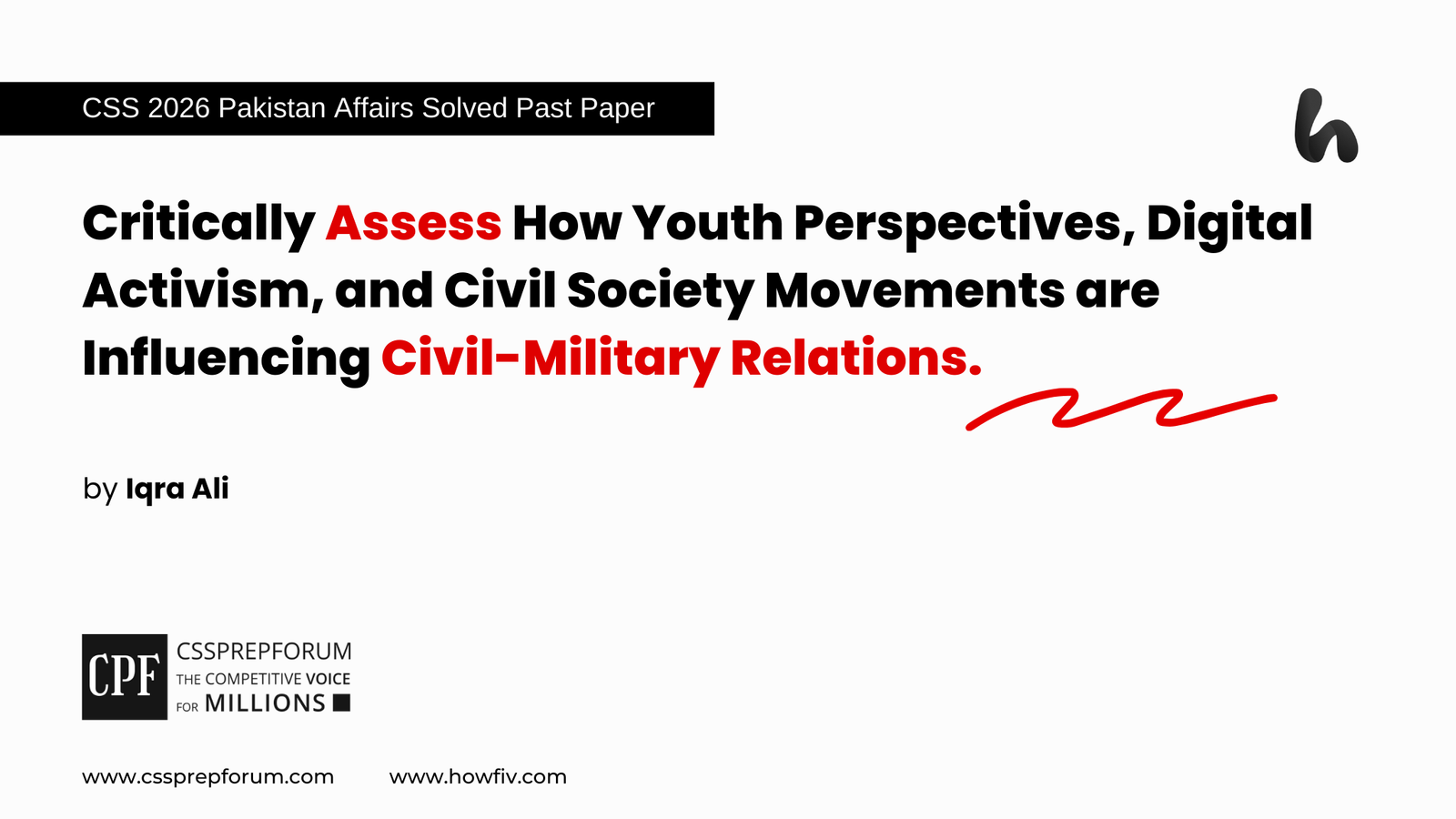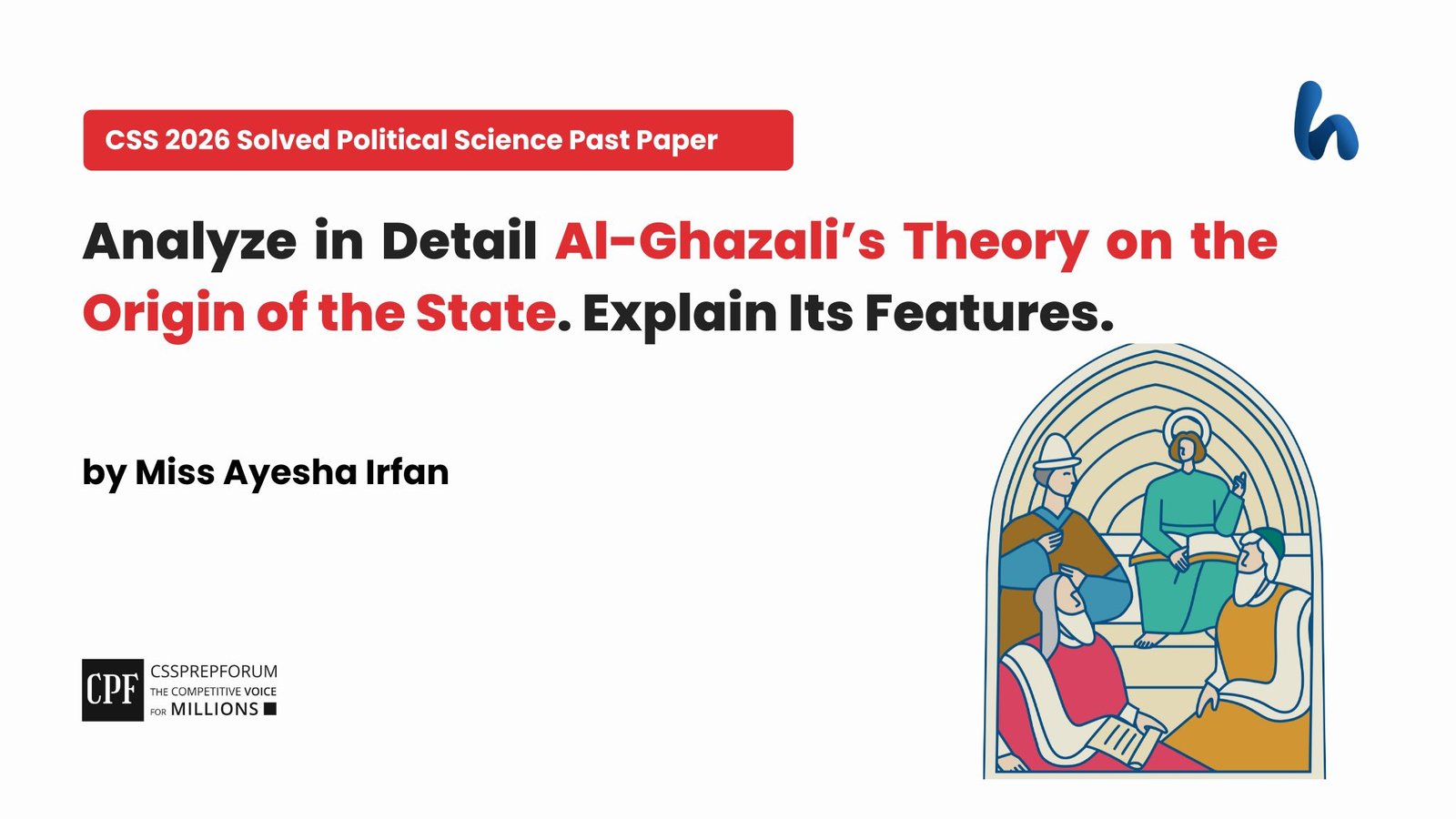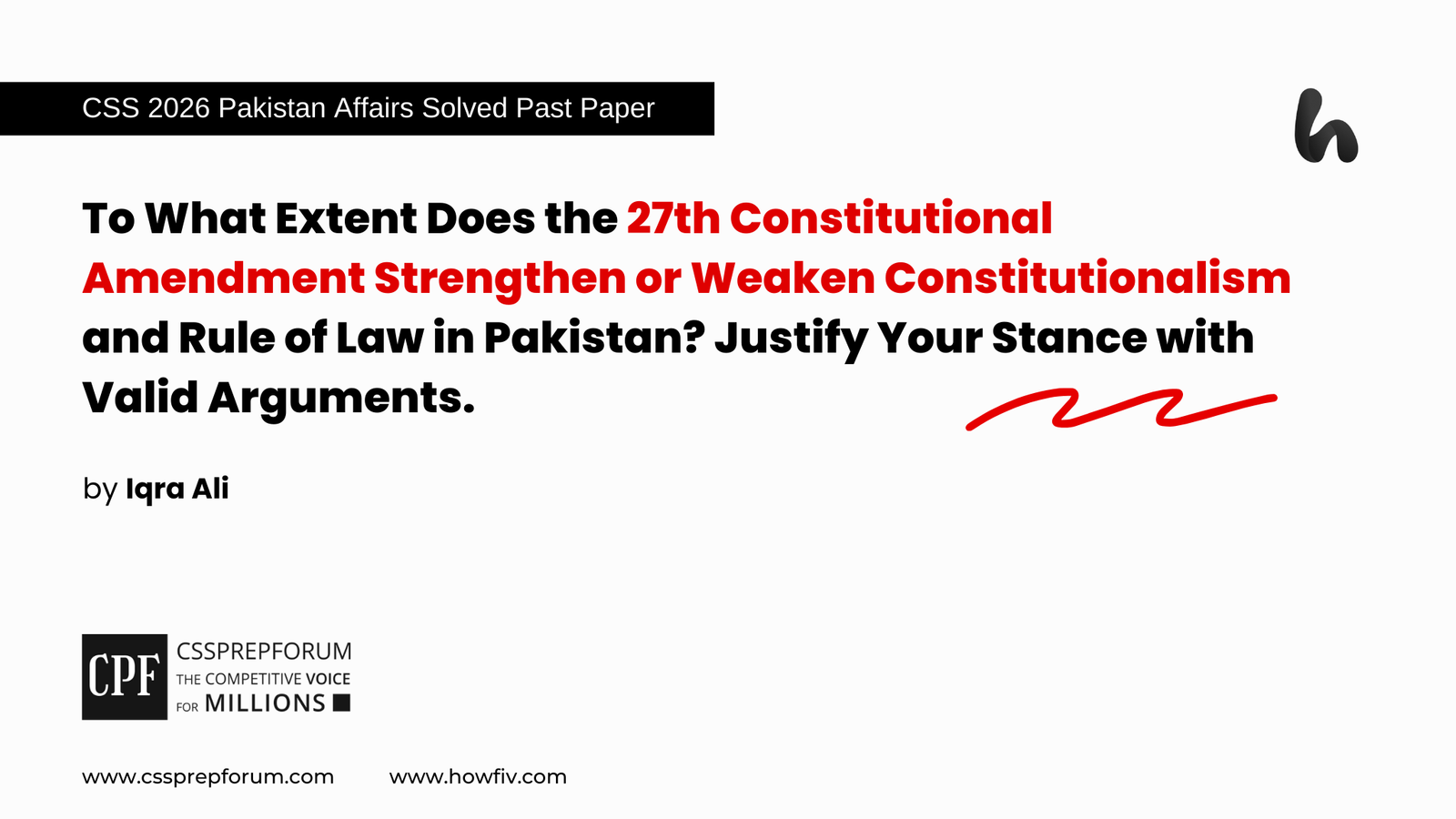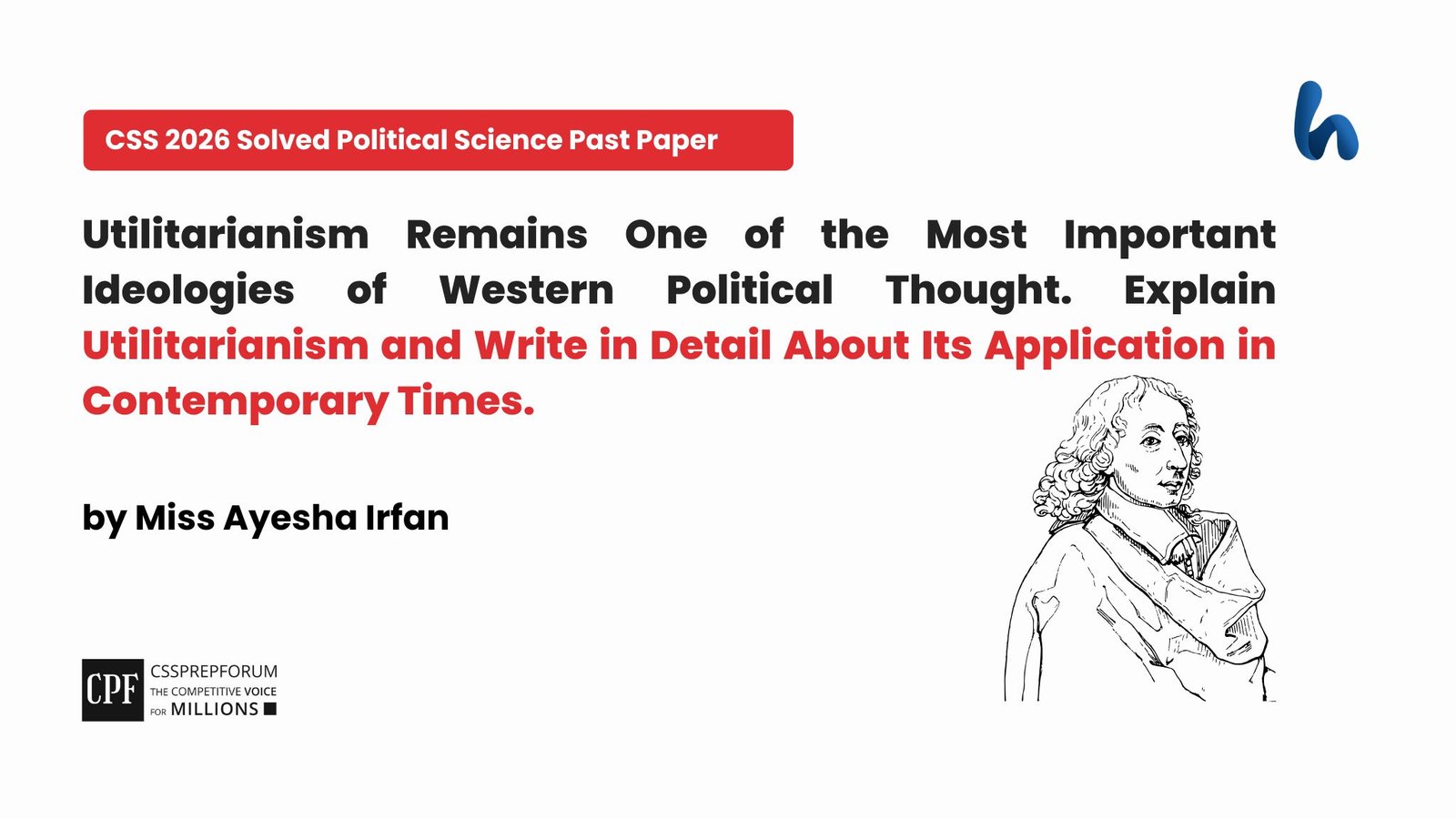CSS Solved Political Science 2024 Past Paper | Importance of Political Parties
The following question is attempted by Miss Dr. Shumaila Parveen, the top scorer in CSS Political Science papers. Moreover, the answer is written on the same pattern, taught by Sir to his students, scoring the highest marks in compulsory subjects for years. This solved past paper question is uploaded to help aspirants understand how to crack a topic or question, how to write relevantly, what coherence is, and how to include and connect ideas, opinions, and suggestions to score the maximum.

Question breakdown
The examiner has asked to focus on two topics: the importance of political parties in a modern state and their role in mobilizing public opinion. The answer opens with an introduction and then builds a thorough understanding of political parties and their significance in a modern state. For the second part, describe public opinion and its agents, then write a detailed analysis of the role of political parties in mobilizing public opinion. Finally, the answer will be wrapped up with a critical analysis and conclusion.
Outline
1-Introduction
Modern states, especially modern democracies, cannot function without proper political parties. Additionally, political parties are immensely involved in devising public opinion; they either bolster the democratic structure of the government and toil in favour of the nation and fellow citizens or antagonize the democratic assembly by distorting public unity through conspiracies, vulnerable slogans, and agenda groups.
2-Understanding of Political Parties
- ✓The concept behind political parties
- ✓Chronicle perspectives
3- Significance of political parties in a modern state
- ✓Embracing popular sovereignty
- ✓Legitimizing authority
- ✓Controlling military involvement in politics
- ✓Ensuring legitimate division of revenue
- ✓Towards collective growth
- ✓Political parties coordinate governance
4- What is public opinion, and how is it shaped?
5-Analyzing the role of political parties in mobilizing public opinion
- ✓Structuring a democracy-optimistic attitude
- ✓Weakening democratic fabric-bleak side
6-Critical analysis
7-Conclusion

Answer to the question
1-Introduction
Modern states, especially modern democracies, cannot be functional without proper political parties, and it does not function well if political parties are weak. Political parties are generally called the agents of social change and the builders of public opinion; thus, strong, nationalist, and honest political parties have sine-qua-non importance for an effective modern state administration. In addition, analyzing political parties’ historical perspectives, their evolution, and their vulnerabilities to military dictatorship, revolutions, and nationalism are common scenarios. However, strong political parties improve government abilities, strengthen development, and encourage politicians to adopt the best economic policy for the good of the people. In summary, strong and candid political parties are essential to sustain democracy. Additionally, they have immense involvement in building public opinion, either in favour of the government, nation, and fellow citizens or antagonizing the democratic structure by distorting public unity through conspiracies, vulnerable slogans, and agenda groups.
2-Understanding of Political Parties
- The concept behind political parties
The concept behind political parties is thought to be necessary; political parties are groups of contestants who either show a particular ideology or take ideological inspiration from the people of specific areas and, later, contest in elections as the representatives of people of specific areas or a province or a country to attain the seat of administration, such as parliament, executive seat, municipal offices, and ministries. In layman’s terms, a political party is a group of candidates that contest during elections to run for public office. In other words, a political party gathers people who share common political ideas. A political party organizes itself, makes agreements with its followers, competes with different political parties in elections, and, if it wins the seat of power, shares plans to utilize political power in favour of its area, province, or state and run the affairs of the state. Additionally, this assembly of men under the banner of one political party provides options to the citizens to choose their representatives who share their ideology.
- Historical perspective
Earlier, before the modern nation-state, during monarchies and aristocratic eras, people tended to gather around princes and nobles, forming groups to support one another’s views or oppose other groups’ agendas. Afterwards, during the 17th century’s Industrial Revolution, people tended to group around industrialists, feudal lords, merchants, and businessmen, including nobles. Later, the waves of parliamentary supremacy, franchising movements, nationalist views, and popular sovereignty, mainly in the 19th century, contoured the concept of political parties. Thus, these political parties were supported by the masses. Moreover, the 20th century witnessed these political parties’ considerable affiliation with military dictatorship, capitalists, revolutionists, and socialists, and even in the extremely modernized world of the present, these parties are governed by religious radicalism, military dictatorship, and extremist political agents.
3-Significance of Political Parties in a Modern State
- Embracing popular sovereignty
Next, the political parties, which originated in Europe and America during the 19th century, have attained immense importance under the slogan of popular sovereignty. The idea of popular sovereignty, a form of government based on the public’s consent, has aspirated political parties’ concept. Political parties, if they do well, can help stabilize democracy, educate and make people aware of their political situation, fetch ideas that best suit their country, and, thus, earn public support and trust, which is the crux of popular sovereignty. Furthermore, even local people with particular political ideologies who want to be part of politics or administration could participate in political parties and represent like-minded folks from specific areas, including minorities and religious groups. Thus, political parties can provide a critical podium to diverse opinions and demands within the electorate.
- Legitimizing authority
In modern states, authority or sovereignty does not solely belong to a sovereign or a clique of aristocrats. Presently, authority fetches its legitimacy through popular approval. Democratic principles, particularly the election system, universal suffrage, representation rights of the majority, minorities, and women, and the rule of law, act as the medium of populous endorsement.
- Controlling military involvement in politics
Besides, a growing body of political studies suggests that robust, well-organized political parties with strong ideologies and policy structures are associated with more sturdy democracies. For instance, the evidence of the involvement of non-political institutions in politics is evident in the case of weak party organizations with unstable strategies to counter the malfunctions of the state. Consequently, democratic collapses are less likely, with strong parties governing the tenets of democracy through their strong political insight, structural management, policy organization, and nationalist perspectives. Thus, with the greater stakes of political parties in the democratic status quo, they attain greater time horizons to oppose the challenges of potential dictators to disrupt democratic standards and organizations.
- Ensuring legitimate division of revenue
Also, with a robust and reliable organizational capacity of political parties, a holistic growth of all social classes and territories of a state is inevitable. The representatives of people and political parties in the parliamentary benches ensure thoughtful decision-making in the division of fiscal revenue. Having a legitimate share, along with honest political representatives, under a local self-government structure possesses all the strength to empower underdeveloped sections of a democratic modern state.
- Towards collective growth
Moreover, a healthy party system with responsible leadership is needed in a modern state. Political parties represent people of diverse ideologies and identities, such as representing people of diverse languages, castes, religions, classes, and areas. Political parties aggregate and represent the interests of a vast majority, under-privileged groups, and minorities, hence enabling the interest of people to have a voice in political decision-making alongside the interests of economic and political actors. Representing the concerns and demands of the people and considering them in policy formation, collective growth, and interfaith harmony, irrespective of alternation in convictions and identities, could be conceivable.
- Political parties coordinate governance
A stable coalition among the political parties in administration and opposition parties works meaningfully, acting as an organized scheme to strive for better government. The government department must take a nationalist criticism of the opposition optimistically, amending policies and helping legislators in decision-making accordingly to better serve the nation. Otherwise, governance would be shaped as a shattered piece of cloth, with no beneficial outcome, a delay in development projects, and widespread mistrust of the people in government office.
4-Public opinion and its agents
As the word “public” refers to a large group of people, their opinion on a particular matter or issue is known as public opinion. So, public opinion is a modern term for expressing or responding to a particular idea, political concern, or national or local issue by the members of society that concerns the well-being of society or has any direct or indirect implications for the people. However, public opinion could be biased, affected, and generated through any means, like political leaders, media channels, limited knowledge, and education schemes. So, all stimuli, mediums, and masterminds who can change public opinion are assumed as the agents of public opinion. Two main approaches are used to build public opinion: propaganda and network. The agents of public opinion shrewdly pick many approaches, such as newspapers, mass media, celestial networks, literature, educational institutes, and interest groups, to spread their interests and manipulate the public and voters.

5-Analyzing the role of political parties in mobilizing public opinion
To analyze the role of political parties in structuring, influencing, and mobilizing public opinion, it is a universal consensus that political parties are one of the main manipulators of public opinion; they use almost all possible approaches to attain the seat of democracy.
In a modern state, power and influence are not simply attained. They require competition and conflicts among contesting groups called political parties. Political parties fight to obtain the support of the public and require voters to legitimize the seat of power and influence. Nonetheless, this approach is intriguing, as political parties shape citizens’ opinions through the agents of public opinion. Further, public opinions depend on the information, efforts, and political scenarios generated and conveyed by political parties.
Moreover, these parties proliferate their policies and agendas through their mass media campaigns and generate public opinion. On the other hand, political parties mobilize public opinion using a combination of mass media communication, interpersonal skills, and conspiracies. The aim is to get maximum support from the public, acquire a voter count, and, eventually, obtain the administration seat.
Besides mobilizing public opinion, political parties either strengthen or weaken democracy. Democracy is a complicated system, and with strong nationalist parties, the governance would be impressive; however, weak political parties would distort the democratic structure of the state. For instance, when parties are weakened, they affect the administration of the modern state in two ways: firstly, the quality of democracy suffers. Voters’ opinions become radical, biased, and apathetic, and they show little trust in the state’s institutions and administration. Second, there would be great chances that a non-representative political party that has its motives to pursue and has no interest in democratic values works with a non-political state’s institutions, which not only ruins the concept of popular government but also weakens democracy.
6-Critical analysis
Critically analyzing the discussion mentioned above, political parties could furnish and blemish the democratic setup of modern states. In numerous modern democratic states, the number of parties is restricted to protect the democracy from polluting. On the other hand, the constitutional edifices of multiple states provide unrestricted space for the evolution of political parties. In either scenario, political parties represent people and structure, mobilize, and influence public opinion, manipulating public sentiments to acquire government bureaus.
7-Conclusion
In summary, political parties are indispensable entities in the modern democratic state. They can empower democracy by voicing the underprivileged sections of society and representing the majority and minorities, making their interests and demands a pivotal part of political decision-making. Additionally, strong, honest, and nationalist political parties provide substantial support for the state’s economic development; they also repel non-political institutions from intervening in power politics. However, the scenario could be reversed if political parties are weak or have internal motives to acquire administration office. Additionally, political parties are considered the constructors, influencers, and mobilizers of public opinion. Consequently, political parties, through generating public opinion and influencing democracy, play a crucial role in modern states.

CSS Solved Past Papers’ Essays
Looking for the last ten years of CSS and PMS Solved Essays and want to know how Sir Kazim’s students write and score the highest marks in the essays’ papers? Then, click on the CSS Solved Essays to start reading them.
CSS Solved Essays

CSS Solved General Science & Ability Past Papers
Want to read the last ten years’ General Science & Ability Solved Past Papers to learn how to attempt them and to score high? Let’s click on the link below to read them all freely. All past papers have been solved by Miss Iqra Ali & Dr Nishat Baloch, Pakistan’s top CSS GSA coach having the highest score of their students.
General Science & Ability Solved Past Papers
CSS Solved Pakistan Affairs Past Papers
Want to read CSS Pakistan Affairs Solved Past Papers and learn how to attempt them to score high? Let’s click on the link below to read them all freely. All past papers’ questions have been attempted by Sir Kazim’s students, who scored the highest in the subject.
CSS Solved Pakistan Affairs
CSS Solved International Relations’ Past Papers
Have you opted for International Relations in the CSS examination and want to score above 150? Then, click on the CSS Solved International Relations’ Past Papers by Miss Abeera Fatima, the top IR scorer and the best IR coach in Pakistan.
CSS Solved International Relations Past Papers











